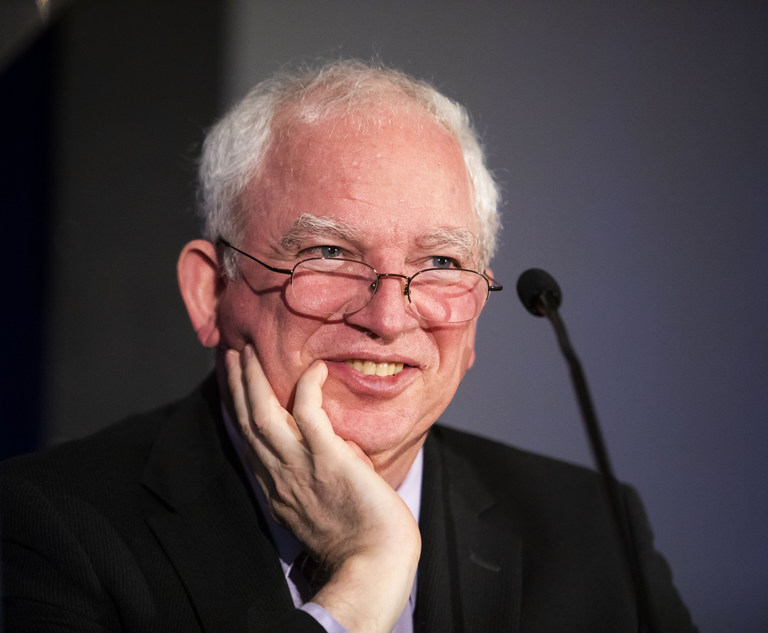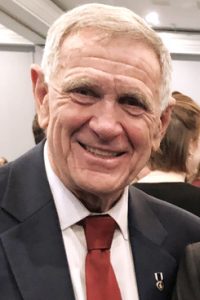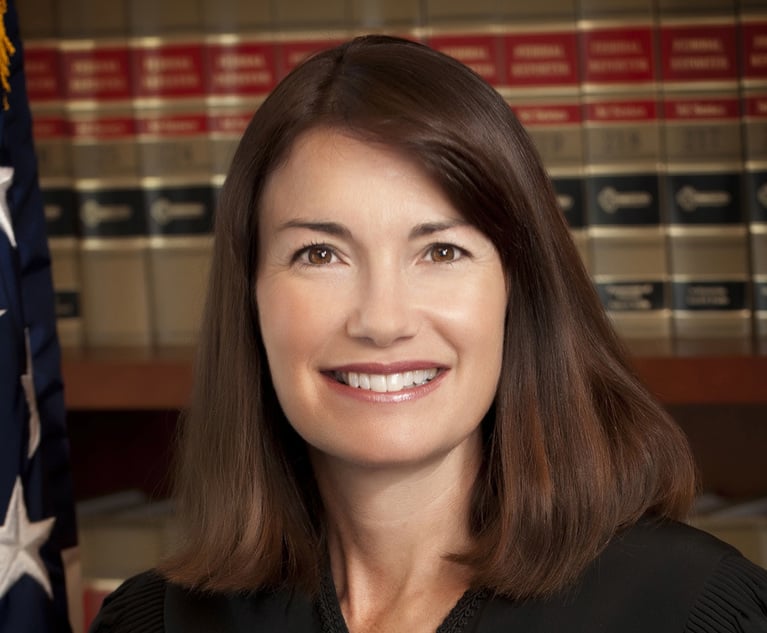After TRO Hearing, John Eastman's Lawyers Will Work With Jan. 6 Committee Regarding Privilege Claims
A status conference is slated for next Monday, with status reports due this Wednesday and Friday.
January 24, 2022 at 10:02 PM
5 minute read
 John Eastman (Photo: Diego M. Radzinschi/ALM)
John Eastman (Photo: Diego M. Radzinschi/ALM)
Lawyers for the Jan. 6 committee, John Eastman and Eastman's ex-employer Chapman University agreed Monday to allow a federal judge to decide disputes over specific documents Eastman believes are privileged, ending a hearing over a subpoena temporary restraining order that revealed new details about the investigation into Eastman.
Eastman has invoked the Fifth Amendment 146 times, said Douglas Letter, general counsel for the U.S. House of Representatives. Eastman's lawyer later confirmed one Fifth reference was in connection with respect to creating a privilege log for the documents.
The Jan. 6 committee served Chapman with a subpoena on Jan. 18 that gave the university three days to hand over all of Eastman's communication through Chapman from Election Day 2020 to Inauguration Day 2021, and Chapman lawyer Fred Plevin says there are more than 19,000 responsive emails.
 U.S. District Judge David Carter of the Central District of California. (Photo: Meghann M. Cuniff/ALM)
U.S. District Judge David Carter of the Central District of California. (Photo: Meghann M. Cuniff/ALM) U.S. District Judge David Carter in the Central District of California issued a temporary restraining order last week at the request of Eastman's lawyers, Anthony Caso of the Constitutional Counsel Group in Anaheim and Charles Burnham of Burnham & Gorokhov in Washington, D.C. Eastman, Caso and Burnham were in Carter's courtroom in Santa Ana on Monday while Letter appeared via Zoom from Washington, D.C. Plevin, of Paul, Plevin, Sullivan & Connaughton in San Diego, was also on Zoom.
Burnham told Carter that Eastman used his Chapman accounts for his legal practice, including his representation of Trump.
"I think it is totally legitimate to consider the effect the enforcement this subpoena will have on the current and former presidents' decisions to hire private counsel," Burnham said.
Letter said Burnham was essentially asking Carter to tell House Speaker Nancy Pelosi how to properly follow House procedures, and he dismissed any notion that the committee is illegitimate. "Obviously, there's a valid legislative purpose for the committee, and I don't think anybody with a straight face could possibly argue otherwise," Letter said.
And regarding Eastman's records, "Let's remember who professor Eastman was or purported to be."
"He was one of the architects of the strategy to overturn the 2020 election," Letter said. "Professor Eastman is extremely relevant to the inquiry by the select committee."
Letter said they knew there could be attorney-client privilege issues, but Eastman refused to discuss; then he "really lowered the boom" by asserting the Fifth Amendment.
"So we tried. We tried over an extended period to get this material," Letter said. "But professor Eastman refused to engage with us."
Letter reminded Carter what Chapman wrote in its filings: That Eastman and all Chapman employees are warned when they sign into Chapman computers that their information is not private. Chapman wants to comply with the subpoena and was attempting to when Eastman sought relief in the U.S. District Court.
Letter told Carter that Eastman "refused to do what so many other witnesses have patriotically done."
"Those people have cooperated with the committee because of the astonishing importance of what the committee is doing," Letter said. "I don't think anybody can reasonably dispute that it is not absolutely essential to find out why there was an attempted coup against the United States government and our democratic foundations and how it happened."
Plevin said Eastman's client during the relevant time frame was Trump, and working for him would constitute political work that's illegal on Chapman's 501(c)(3) status.
"Mr. Eastman's representation of the former president was not authorized by Chapman University," Plevin said. "Had he asked for such authorization, it would have been denied on the basis of the IRS rules. He likened the use of Chapman's server for that "to contraband."
Carter read a list of work Eastman did for Trump, including a meeting he had with Trump and then-Vice President Mike Pence, and asked Plevin if Chapman authorized the work. Plevin said "no" each time and said he couldn't rule out that Eastman used Chapman equipment for the work.
Carter asked Letter if the committee considered creating a taint team or privilege-review team to review responses to the subpoena, but Letter said he couldn't say.
"The internal operations of the House of Representatives are protected," Letter told the judge.
Carter asked Eastman to consider creating a privilege log, but he declined, saying he had other legal arguments against the subpoena beyond attorney-client privilege claims. So the judge later said he'd order one to be created and that counsel from Washington, D.C., would have to travel to Chapman University, unless they could come up with their own solution. Carter left the bench for several minutes and the attorneys muted Zoom and joined a private three-way phone call to strike a deal.
Plevin said Chapman will release all responsive documents to Eastman by noon Tuesday. He asked if Chapman could be dismissed form the process after that, but Carter declined.
A status conference is slated for next Monday, with status reports due this Wednesday and Friday.
This content has been archived. It is available through our partners, LexisNexis® and Bloomberg Law.
To view this content, please continue to their sites.
Not a Lexis Subscriber?
Subscribe Now
Not a Bloomberg Law Subscriber?
Subscribe Now
NOT FOR REPRINT
© 2025 ALM Global, LLC, All Rights Reserved. Request academic re-use from www.copyright.com. All other uses, submit a request to [email protected]. For more information visit Asset & Logo Licensing.
You Might Like
View All
Church of Scientology Set to Depose Phila. Attorney in Sexual Abuse Case
5 minute read


Judge Asks: Should Tom Girardi Serve Sentence in a Medical Facility or Behind Bars?
4 minute readLaw Firms Mentioned
Trending Stories
- 1Supreme Court Appears Sympathetic to Law Requiring Porn Sites to Verify Users' Age
- 2Cybersecurity Breaches, Cyberbullying, and Ways to Help Protect Clients From Both
- 3AI in 2025: Five Key Predictions on How It Will Reshape International Law Firms
- 4Justice Known for Asking 'Tough Questions' Resolves to Improve Civility
- 5Robinson & Cole Elects New Partners and Counsel
Who Got The Work
J. Brugh Lower of Gibbons has entered an appearance for industrial equipment supplier Devco Corporation in a pending trademark infringement lawsuit. The suit, accusing the defendant of selling knock-off Graco products, was filed Dec. 18 in New Jersey District Court by Rivkin Radler on behalf of Graco Inc. and Graco Minnesota. The case, assigned to U.S. District Judge Zahid N. Quraishi, is 3:24-cv-11294, Graco Inc. et al v. Devco Corporation.
Who Got The Work
Rebecca Maller-Stein and Kent A. Yalowitz of Arnold & Porter Kaye Scholer have entered their appearances for Hanaco Venture Capital and its executives, Lior Prosor and David Frankel, in a pending securities lawsuit. The action, filed on Dec. 24 in New York Southern District Court by Zell, Aron & Co. on behalf of Goldeneye Advisors, accuses the defendants of negligently and fraudulently managing the plaintiff's $1 million investment. The case, assigned to U.S. District Judge Vernon S. Broderick, is 1:24-cv-09918, Goldeneye Advisors, LLC v. Hanaco Venture Capital, Ltd. et al.
Who Got The Work
Attorneys from A&O Shearman has stepped in as defense counsel for Toronto-Dominion Bank and other defendants in a pending securities class action. The suit, filed Dec. 11 in New York Southern District Court by Bleichmar Fonti & Auld, accuses the defendants of concealing the bank's 'pervasive' deficiencies in regards to its compliance with the Bank Secrecy Act and the quality of its anti-money laundering controls. The case, assigned to U.S. District Judge Arun Subramanian, is 1:24-cv-09445, Gonzalez v. The Toronto-Dominion Bank et al.
Who Got The Work
Crown Castle International, a Pennsylvania company providing shared communications infrastructure, has turned to Luke D. Wolf of Gordon Rees Scully Mansukhani to fend off a pending breach-of-contract lawsuit. The court action, filed Nov. 25 in Michigan Eastern District Court by Hooper Hathaway PC on behalf of The Town Residences LLC, accuses Crown Castle of failing to transfer approximately $30,000 in utility payments from T-Mobile in breach of a roof-top lease and assignment agreement. The case, assigned to U.S. District Judge Susan K. Declercq, is 2:24-cv-13131, The Town Residences LLC v. T-Mobile US, Inc. et al.
Who Got The Work
Wilfred P. Coronato and Daniel M. Schwartz of McCarter & English have stepped in as defense counsel to Electrolux Home Products Inc. in a pending product liability lawsuit. The court action, filed Nov. 26 in New York Eastern District Court by Poulos Lopiccolo PC and Nagel Rice LLP on behalf of David Stern, alleges that the defendant's refrigerators’ drawers and shelving repeatedly break and fall apart within months after purchase. The case, assigned to U.S. District Judge Joan M. Azrack, is 2:24-cv-08204, Stern v. Electrolux Home Products, Inc.
Featured Firms
Law Offices of Gary Martin Hays & Associates, P.C.
(470) 294-1674
Law Offices of Mark E. Salomone
(857) 444-6468
Smith & Hassler
(713) 739-1250






